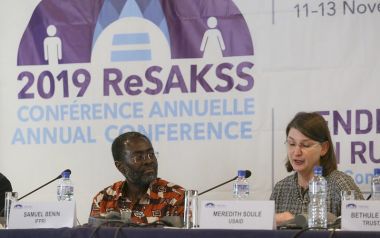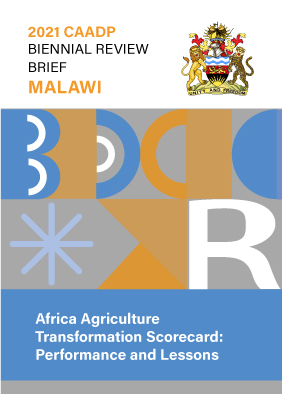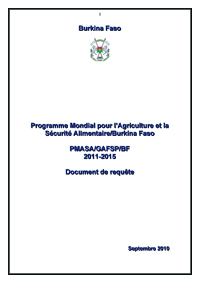
Third in a series of blog posts on the release of the 2019 Annual Trends and Outlook Report (ATOR) at the ReSAKSS Annual Conference in Lomé, Togo, Nov. 11-13. This year’s ATOR theme is “Gender Equality in Rural Africa: From Commitments to Outcomes.” Read the first post here and the second post here.
Evidence shows that gender disparities are undermining African countries’ ability to meet their goals of ending hunger, reducing poverty, boosting trade, and increasing resilience to climate change and other risks. How can Africa enhance gender equality and fulfill important development goals?
Policy makers, researchers, and gender experts, along with representatives of continental and regional organizations, farmers’ organizations, civil society, and development agencies, gathered Nov. 11-13 in Lomé, Togo, to grapple with these questions at the 2019 Regional Strategic Analysis and Knowledge Support System (ReSAKSS) Annual Conference, with the theme Gender Equality in Rural Africa: From Commitments to Outcomes. The conference, organized by IFPRI in partnership with the African Union Commission’s Department of Rural Economy and Agriculture, marked the launch of the 2019 Annual Trends and Outlook Report (ATOR) focused on the same gender theme.
Across Africa, agriculture remains a crucial sector for food security, nutrition, economic growth, and employment, particularly for women. Yet studies consistently show that women in agriculture have less access to resources and lower productivity than men. Addressing these gender inequalities is central to increasing opportunities for agricultural growth and transformation for both men and women. Opening the conference, Togo Minister of Agriculture, Animal Production, and Fisheries Noël Koutéra Bataka stressed the importance of addressing the gendered agricultural productivity gap. He noted that Togo, through its national agriculture investment plan for 2017-2026, was doing precisely that with programs to improve women’s productivity and socioeconomic conditions, particularly their access to and control of resources.
In the keynote address, Monica Kapiriri, a development facilitator and African Women in Agricultural Research and Development (AWARD) Fellow, highlighted the importance of “minding the cracks” that may emerge if gendered needs and challenges are not considered in policies and programs targeting rural Africa. To address this problem, Kapiriri advocated investing in transformative change that seeks to dismantle the root causes of inequalities and adverse outcomes by assessing “the formal and informal laws, practices and norms that govern interactions between people and resources.”
Conference delegates discussed evidence presented in the various 2019 ATOR chapters and case studies that supports such transformative change and offered potential strategies to enhance gender equality. Report co-editors and authors applied gender lenses to topics including leadership, land rights, agricultural value chains, agricultural productivity, youth livelihoods, social protection schemes, nutrition, control over income, financial inclusion, trade, and women’s empowerment. Gender norms and institutional biases have caused many women and men to fall into “cracks” across these areas that constrain incomes, assets, productive capacity, human capital, and overall well-being.
The negative impacts of gender disparities are felt at all levels—individual, household, community, and national. “For individuals, the costs of gender inequalities are in missed opportunities,” IFPRI Senior Research Fellow and report editor Agnes Quisumbing explained in a video introduction to the ATOR. For example, “norms of masculinity hold men back from participating fully in caring for their children, while women are often barred from entering many careers in the formal economy. These costs may bear further social costs as well, such as higher rates of intimate partner violence and decreased resilience to adversity.”
On a broader scale, gender gaps prevent nations from benefiting from trade reform, for example. As the 2019 ATOR chapter by IFPRI researchers Ismael Fofana, Sunday Odjo, and Fousseini Traoré explains, even if well-intentioned trade liberalization policies in Niger increase employment and earnings, underlying gendered inequalities in access to resources may actually worsen existing gender gaps.
Conference participants also discussed the importance of high quality comprehensive data around gendered differences to guide future policy making. The 2019 ATOR notes that the Women’s Empowerment in Agriculture Index (WEAI) is a reliable tool for measuring and tracking changes in women’s empowerment over time and across countries, regions, and population subgroups.
As the ATOR is the official monitoring and evaluation report for the Comprehensive Africa Agriculture Development Programme (CAADP), participants also discussed the findings of the chapter that tracks CAADP indicators and progress in preparing for the second CAADP Biennial Review and in formulating Malabo-compliant second-generation national agriculture investment plans. More sex-disaggregated data at the national level—including on women’s empowerment in agriculture—are needed to better monitor CAADP implementation progress and ensure that Malabo Declaration commitments help to advance gender equality.
“We have reasons to be optimistic,” says IFPRI Senior Research Fellow and report co-editor Ruth Meinzen-Dick. “We have the knowledge and increasingly better data to commit to gender equality. Drawing together all of our political will, we can make informed decisions in future policy plans and programming to ensure women and men both benefit from agricultural growth.”
Download the 2019 ATOR, Gender Equality in Rural Africa: From Commitments to Outcomes, to learn more about existing evidence to guide transformative change. Together, we can “mind the cracks” and ensure everyone, regardless of gender, reaps the benefits of agricultural growth and transformation, and gender equality.
Emily Myers is a Research Analyst with IFPRI's Poverty, Health, and Nutrition Division; Tsitsi Makombe is a Senior Program Manager with IFPRI's Africa Office.
This post first appears on IFPRI website.


